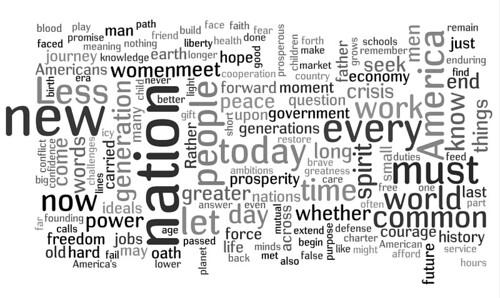At Native, we do like to note when current affairs and news intersect with online media.
The site Whitehouse.gov has just relaunched for the new US administration. We’ll be looking particularly at their blog as well as Barack Obama on Twitter and any other officially-sanctioned tools and sites, to see how the US government are embracing them.
If this flood of US news is getting too much, the Kazakh prime minister has not only started a blog but also ordered his ministers to start their own blogs.

How To Avert a PR Nightmare with Social Media – Ford vs Chrysler
[ UPDATE, 22/01/09: There’s a link to the Chrysler website in the post below. It appears the car company took action and deleted their entire blogpost and comments on Thursday after some serious action on the recommendation site Digg. The image of the ad is still there. If you want to read the post and the comment pandemonium, Google have a barebones archive version in their cache. In my opinion, Chrysler would be better off owning this series of gaffes and explicitly dealing with the issue on their blog. As it goes, they’ve attempted to cover it up and censor the comments, thus being seen to fail once more. It kind of makes you feel sorry for them. ]
Here’s an intriguing article on Fast Company magazine about how Ford cars dealt with some negative publicity online last month.
While it mentions the rapid responses by their head of social media, Scott Monty, it may leave you wanting more details about the incident. So here’s the full story and Monty’s own account.
The key to this, in my opinion, is that Monty possessed additional information which he was able to share to calm down the bloggers and Twitter users.
In the meantime, many people emphasise the power of the web to engender good reputation for a product. But it’s just as powerful in the other direction. Elsewhere in the auto industry, Chrysler are suffering from the heat of almost a month of commenting fury. Why? Because after receiving a financial bail-out from the US government, Chrysler placed expensive national press adverts – to thank the public for “their” financial support.
This was viewed by many as a crass and wasteful move. The comments are largely variations on this theme:
Oof! We also have:
I don’t pretend to know very much about the auto industry. Even so, being based in Cardiff, Wales, I probably wouldn’t have picked up the Chrysler story – if it weren’t for the blogging frenzy that ensued and brought it to my attention. A quick look at Google Blog Search reveals hordes of US taxpayers expressing this. Here’s one. Here’s another. And another. Yet another. That’s just the front page of results. Here’s Fox News for good measure. Chrysler never dealt with any of the individual comments. Eventually they did attempt to respond with a very brief post in their own defence.
There’s a good chance your brand or business will not be facing publicity issues of this magnitude. But these are useful reminders of the importance of monitoring what people are saying about you online. People won’t necessarily choose to make any of these comments directly to you. Nor will they necessarily come to “your space”.
Often it will be people saying complimentary things, which is a great way to improve your day. But at some point, you may need to respond appropriately to something negative, or indeed a full blown crisis. Preferably immediately.
Your own blog can be a good place to respond. (You don’t have a blog? It’s extremely handy to have an active blog ready for these situations.)
I must confess to being a collector of these kinds of stories.
Another one of my grisly favourites concerns Target, a retailer, and dates from January 2008. When a blogger complained about an image in an advert, Target’s PR people refused to answer properly. Instead they cited a policy that they don’t talk to “nontraditional media”, in this case a blogger (read: influential customer). Whether or not you agree with the nature of the original customer complaint doesn’t matter. This was a snubbing which backfired – even if Target did ignore the blogs, it ended up in the New York Times anyway.